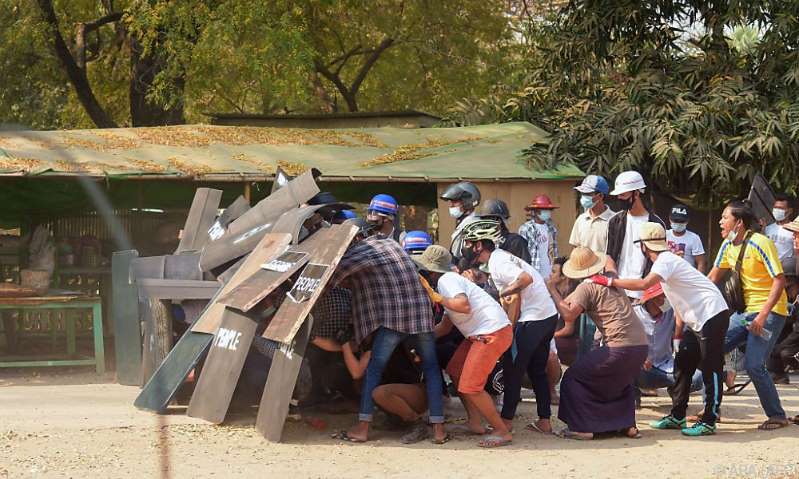Myanmar's military carried out numerous raids on the largest city of Yangon on Sunday evening after protests by opponents of the military coup. Gunfire has been reported from several areas of the former capital formerly known as Rangoon. Security forces moved in front of hospitals and universities, among other places, and patrolled residential areas. Leading unions had called for a general strike on Monday.

Image: APA (AFP)
Unverified but consistent videos from different angles on social media showed emergency services, popping noises and muzzle flashes around the Yangon General Hospital, for example. “The military forces came to the hospital in our neighborhood. People came to them and asked them not to go because it would scare people too much. But they shot people with live ammunition,” a resident of North Okkalapa told a reporter the German Press Agency. “Some were very badly wounded. We currently know nothing about the dead. They arrested people.”
In another district of Yangon, security forces arrested more than 100 demonstrators on Sunday evening, according to media reports. Nationwide, according to media reports, the military deployed troops in more than ten hospitals and several universities, where the protest movement is said to have a particularly large number of supporters.
Previously, hundreds of thousands of people had demonstrated against the military across the country. The security forces again acted violently, using live ammunition against the demonstrators in several cities. Shots are said to have been fired during night raids in the economic metropolis of Yangon, and a supporter of the National League for Democracy (NLD) was beaten to death.
“In some districts NLD officials have been arrested, we don't know exactly how many,” Soe Win, a party representative of the disempowered de facto prime minister Aung San Suu Kyi, told AFP. At least one of them, 58-year-old Khin Maung Latt, was killed during a raid in Yangon (formerly Rangoon), said Tun Kyi of the “Former Political Prisoners' Representation”. He was “subjected to a tough interrogation”. The man's body was already on the way to the cemetery from the military hospital.
The NLD MP Sithu Maung reported on Facebook that forces from the military junta had turned up at the house of party spokesman U Maung Maung that night. When they couldn't find him there, they beat and tortured his brother.
In the state media of Myanmar, MPs who have come together to form the Pyidaungsu Hluttaw Committee have received massive threats. By claiming to be the legitimate government of Myanmar, they committed “high treason”. This will be punished with long imprisonment or death, it said in statements of the state media.
Despite the raids, threats and intimidation, protests against the military coup in early February and for the release of Aung San Suu Kyi continue unabated. At a large rally in the second largest city of Mandalay, security forces used tear gas, rubber bullets and live ammunition against demonstrators on Sunday afternoon. Yan Naing from Mandalay Ambulance reported that two of his colleagues were shot on motorcycles – one escaped and the other was taken away by security forces. In Mandalay, activists protested with a sit-in strike after they had thought of the people killed by the police and army during the protests in recent weeks with two minutes of silence.
According to eyewitness reports, security forces opened fire in the historic temple city of Bagan, known worldwide for its many pagodas, to break up a protest. A 19-year-old man was shot in the jaw, according to rescue workers. A 56-year-old woman was hit in the leg by a rubber bullet.
There were also demonstrations in around half a dozen other cities, including the largest city of Yangon. In the city of Lashio in the north of the Southeast Asian country, the police used tear gas and stun grenades against demonstrators, as live images on Facebook showed.
Meanwhile, nine unions called for nationwide strikes from Monday on Sunday. All people should stop working to bring about a “complete, extended standstill” of the country's economy, it said. On Saturday state media threatened public officials with immediate dismissal if they did not return to their jobs. Numerous civil servants are currently boycotting the work in protest against the junta. The junta wants to reopen the banks in the Southeast Asian country on Monday.
The military had carried out a coup on February 1 and placed the democratically elected de facto head of government Suu Kyi under house arrest. Since then, the protests against the junta have continued, which are using increasingly harsh methods against the demonstrators. According to the UN, at least 55 people have been killed since the beginning of February. On Wednesday alone, the bloodiest day to date, 38 people died as a result of the violent crackdown on the protests. Civil rights groups also speak of over 1,700 arrests.

